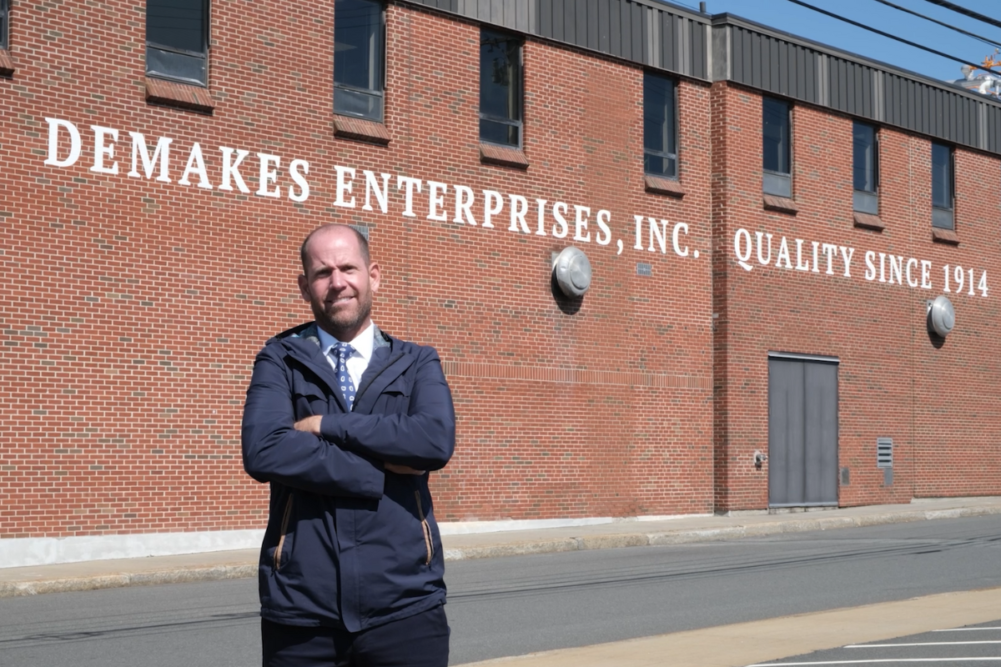Keeping Generational Traditions Alive
For over 100 years, Demakes Enterprises has been a staple name in quality meats. Founded in 1914 by Greek immigrant and great-grandmother of the Demakes brothers with her famous Greek sausage recipe, this fourth-generation, family-owned company continues to craft exceptional deli meats, sausages, hot dogs, and more from their headquarters in Lynn, Massachusetts.
Using generational recipes, Demakes sources only the finest meats and ingredients to produce their retail, food service, and private-label products. The company combines artisanal processes with state-of-the-art equipment in their SQF and organic-certified plant, aiming to deliver maximum flavor and quality to consumers.
From those early days selling Greek sausage to neighbors, Demakes expanded into a wide range of value-add products from raw marinated meats and prepared meat skewers to shaved meats and heat-and-serve entrees.
 Source: Demakes Enterprises
Source: Demakes Enterprises Keeping Quality from Coast to Coast: How HPP Helped Demakes Enterprises Go National
With growth came challenges, such as limited shelf-life. Demakes needed to extend shelf-life, while staying committed to keeping their foods all-natural, with no artificial ingredients antibiotics, or preservatives.
High pressure processing (HPP) technology was their answer. It transformed Demakes Enterprises from a regional deli meat company to a national provider of clean label, preservative-free meats.
HPP technology, also known as cold pasteurization in the meat, poultry and food processing industry, is a non-thermal, food preservation method that uses water and high pressure. It is called cold pasteurization because the water temperature in the process is between 5˚C and 20˚C. But the water pressure is extremely high – 87,000 lbs. per square inch.
Roberto Peregrina, USA Executive Director at Hiperbaric, manufacturer of HPP equipment, explained how the process works:
-
Loading: Packaged meat products are manually or automatically loaded into plastic baskets. If manual, operators arrange the packages to optimize space while avoiding crushing.
-
Water Filling: The filled baskets are wheeled into the high pressure vessel, which is filled with low pressure water and sealed.
-
Pressurization: Once filled, the system instantly applies isostatic pressure of up to 87,000 psi to the product for typically 180 seconds. This enables compression up to 15% of each package.
-
Depressurization: After holding at pressure, the system instantly depressurizes.
- Unloading: The baskets are pushed through an outfeed conveyor, where the treated product can be removed from the basket.
 Source: Hiperbaric
Source: Hiperbaric
Roberto, added, “HPP is able to enhance food safety by controlling pathogens and extend shelf-life, without compromising on quality. Since it is a post-packaging process, it also helps prevent recontamination and recalls”.
Without the need for preservatives, HPP has allowed Demakes to increase shelf life of their pre-sliced organic deli meat from 49 days to 120 days, a 60% increase. Demakes can now build inventories and ship deli meats all over country, to foodservice and retailers including Kroger and Aldi.
As a result of this additional shelf-life, business has expanded by approximately 25%.
HPP has also enabled Demakes to start a marinated meat line under Old Neighborhood Foods. Competition in this space is high, but HPP enabled the competitive advantage to enter the market with extended shelf-life products. Today, it’s one of their fastest-growing categories.
All raw meats typically have a seven- to 10-day shelf life, but with HPP, their raw marinated chicken products now have a 42-day shelf life, and their raw marinated steak products have a 56-day shelf life. Another key advantage is taste – HPP further helps to marinate using pressure, creating a moist and juicy flavor profile.
Andrew Demakes, Director of Operations at Demakes Enterprises, states, "HPP extends shelf life naturally, which was a big component because we sell very high-quality products with minimal ingredients. We want to make sure that we maintain the integrity of the product, so being able to pick up that additional shelf life without compromising quality was very important to us".
Vertically Integrated: Bringing HPP Equipment In-House
When Demakes Enterprises first learned about HPP, they initially started out using a toller, a third-party service provider. However, the company realized that if they wanted to grow, they needed to make the financial investment in their own equipment. This led them to purchase their first Hiperbaric 420L machine in 2015, followed by a 525L machine 2022.
 Source: Hiperbaric
Source: Hiperbaric
Purchasing their own machine was a big commitment, as Demakes needed to build a facility to house the HPP unit and make a significant capital investment. Having their own equipment, however, allowed them to save on transportation and logistics costs. They offset some expenses by providing HPP services for other companies, but today Demakes has built enough capacity to mostly process their own products.
From meat trimming and cooking to final packaging and processing, everything now happens in-house allowing for quality control and efficiency.
By becoming vertically integrated, Demakes is able to focus on growing their brands, as well as private label brands of their many strong partners.
Andrew states, “HPP is a big part of our business’s success. With new advances on the horizon, we look forward to additional improvements this technology will bring”.
When asked about the 8-year long partnership with Hiperbaric, Andrew shared, “We've always been impressed with the around-the-clock service we get from the Hiperbaric team. Whenever we have any questions related to our HPP machine, we know we can count on fast, knowledgeable support, day or night. The Hiperbaric technicians are always available to troubleshoot issues. Their 24/7 remote assistance support has been invaluable in keeping our equipment running smoothly and maximizing uptime”.



